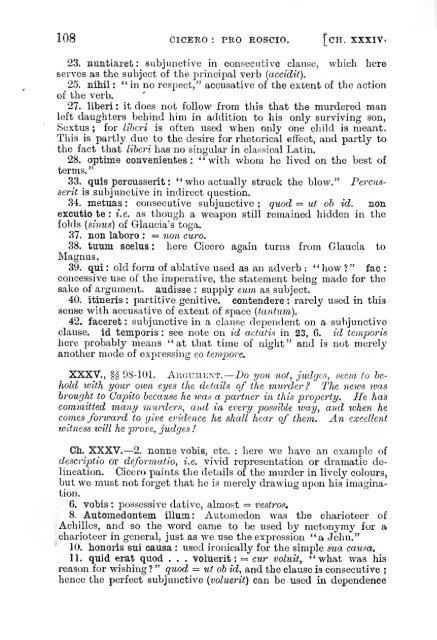Pro S. Roscio Amerino
Pro S. Roscio Amerino
Pro S. Roscio Amerino
You also want an ePaper? Increase the reach of your titles
YUMPU automatically turns print PDFs into web optimized ePapers that Google loves.
108 CICERO : PRO ROSCIO. [cH. XXXIV-<br />
23. nmitiaret: subjunetive in consecuLive clause, wliich here<br />
serves as the subject of the principal verb (accidit).<br />
25. nihil : " in no respect," accusative of the extent of the action<br />
of the verb.<br />
27. liberi : it does not follow from this that the murdered man<br />
left daughters behind him in addition to his only surviving son,<br />
Sextus ; for liheri is often used when only one child is meant.<br />
Tliis is partly due to the desire for rhetorical efFeet, and partly to<br />
the fact that liberi has no singular in classical Latin.<br />
'<br />
28. optime convenientes : ' with whom he lived on the best of<br />
terms."<br />
33. quis percusserit : "whoactually struck the blow." Percusserit<br />
is subjunctive in indirect question.<br />
34. metuas : consecutive subjunctive quod = ut ; ob id. non<br />
excutio te : i.e. as though a weapon still remained hidden in the<br />
folds (sinus) of Glaucia's toga.<br />
37. non laboro : =<br />
non curo.<br />
38. tuiun scelus : here Cicero again turns from Glaueia to<br />
Magnus.<br />
39. qui : old form of ablative used as an adverb : " how ?" fac :<br />
concessive use of the imperative, the statement being made for the<br />
sake of argument. audisse : supply eum as subjeet.<br />
40. itineris : partitive genitive. contendere : rarely used in this<br />
sense with aceusative of extent of space (tanttim).<br />
42. faceret : subjunctive in a clause dependent on a subjunctive<br />
clause. id temporis : see note on id aetatis in 23, 6. id temporis<br />
here probably means " at that time of night" and is not merely<br />
another mode of expressing eo tempore.<br />
§§ 98-101. Argument.—Do you not, judges, seem io behold<br />
with your own eyes the details of the murder? The neivs was<br />
brought to Capito because he was a partner in this property. He has<br />
committed many murders, and in every possible way, and when he<br />
comes forward to give evidence he shall hear of them. An excellent<br />
witness will he prove, judges !<br />
Ch. XXXV.—2. nonne vobis, etc. : here we have an example of<br />
descriptio or deformatio, i.e. vivid representation or dramatic delineation.<br />
Cieero paints the details of the murder in lively colours,<br />
but we must not forget that he is merely drawing upon his imagination.<br />
, 6. vobis : possessive dative, almost = vestros.<br />
i 8. Automedontem illum: Automedon was the charioteer of<br />
{Achilles, and so the word came to be used by metonymy for a<br />
lcharioteer in general, just as we use the expression " a Jehu."<br />
10. honoris sui causa : used ironieally for the simple sua causa.<br />
11. quid erat quod . . . voluerit : = cur voluit, "what was his<br />
reason for wishing ? " quod = ut ob id, and the clause is conseeutive ;<br />
hence the perfect subjunctive (voluerit) can be used in dependence

















